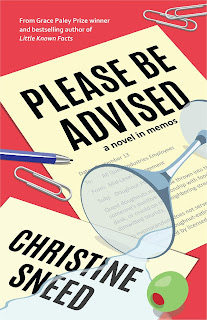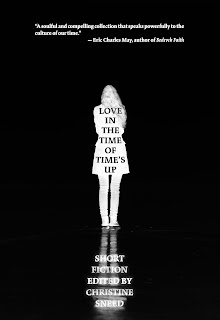Christine Sneed is the author of the new novel Please Be Advised, and the editor of the new anthology Love in the Time of Time's Up. Her other books include the novel Paris, He Said, and her work has appeared in a variety of publications, including The New York Times and O Magazine.
Q: What inspired you to write Please Be Advised, and why did you decide to write the novel in the form of memos?
A: The memo appealed to me in part due to its compactness—each one was essentially a piece of stand-alone flash fiction, or a specimen of prose poetry, but taken as a whole, these 125+ memos form a portrait of a workplace/community, Quest Industries in this case, like a traditional novel usually does.
Using memo format also permitted me to take on the voices of many different characters. There are memos from individual employees, as well as memos written by “Lower-Level Management,” “Mid-Level Management,” and “Upper-Level Management.”
I saw these non-specific senders of many of the book’s memos as a cross between subterfuge and collectivity. Using a management label allowed the person who actually penned it to hide behind the scrim of the group they’re purporting to be a spokesperson for.
I still tried to imbue each of the three management teams with a distinct voice, as with the memos I wrote for characters such as President Bryan Stokerly, Esq. or office manager Ken Crickshaw Jr. (who ultimately serve as foils for each other, and by the book’s end are at distinct odds with each other—Ken is a disgraced coroner/recovering alcoholic and Bryan is an inveterate drinker/overconfident buffoon).
Q: The writer Caroline Leavitt said of the book, “Cubicle culture has never been targeted more hilariously than in Sneed’s exuberant, totally-told-through-memos tale of the rise and fall of Quest Industries.” What do you think of that description, and how did you create Quest Industries?
A: I worked in a corporate office for two years directly after college. I’d previously worked in a student-loan-focused collection agency, and I’d say the spirit of these two offices lives on in Please Be Advised.
My erstwhile colleagues overall were kind people who tried to do their best every day, but I suspect, now that I’m much older and can see the contours of the world a little more clearly, many of them very likely struggled a little (or a lot) to get themselves in the car and to the office day after day to do work they had mixed feelings about or at worst actively disliked.
In the years since the late ‘80s when I worked at the collection agency, many companies have tried to make the workplace a more enjoyable place to be, but I’d say that their success rate is anyone’s guess, especially since the pandemic and the rise of online software designed to spy on employees who work remotely.
It made me very happy to see Caroline Leavitt describe this novel as exuberant and hilarious—I really wanted to explore many possibilities for workplace-related humor in this book.
Companies are like little fiefdoms and are very much colored and guided by their alpha employees’ personalities. Laughter certainly makes my life more bearable, and humor for me has always been a strong defense against anger, ennui, and despair.
Jokes and people with quirky sensibilities, with which I tried hard to endow the characters in Please Be Advised, can make repetitive or frustrating or obscenely boring workdays much more bearable—they definitely did for me at the many jobs I’ve had throughout my life.
Q: You also have an anthology of short fiction, Love in the Time of Time’s Up, being published this fall. How did you come up with the idea for the anthology, and for your own story, “Potpourri”?
A: I’m not sure where the idea for this anthology originated, but I do remember when—January 2020.
In December 2017, two months after Jodi Kantor and Megan Twohey’s incendiary story about Harvey Weinstein’s decades long run of sexual predation appeared in The New York Times, Kristen Roupenian’s story “Cat Person,” published in The New Yorker, went viral online. It’s a story that addresses Me Too-related themes—a May-December romance that goes awry.
I read the story when it came out, admired it, and figured that one reason for its popularity was its timing. Later, I heard from a friend that her students loved it too but all thought it was nonfiction.
This discovery irritated me on a couple of different levels—why is that many people don’t know that a short story is fiction, i.e., made up? Even if there might be some details from the author’s (or someone else’s—as turned out to be the case with “Cat Person”) life in a work of fiction, a short story is not supposed to be read as a true, i.e., nonfiction.
Anyway, with this bee in my bonnet, eventually I started thinking about putting together an anthology of short stories that addressed from many different angles Time’s Up and Me Too, and began querying friends who write fiction to see if they’d be willing to contribute a story to it. Fifteen said yes (along with a few other writers who ultimately weren’t able to contribute a story for one reason or another).
As for “Potpourri,” over the last few years, I’ve written some fiction with main characters who earn some part of their living as sex workers.
While writing this particular story, I was interested in examining accountability. The man in this story might be a well-dressed dirtbag, but Lucy, the main character, is to some degree complicit in what happens between them. My sympathies are entirely with her but I also don’t think of her as an innocent who was preyed upon by a scuzzball.
Q: How were the stories chosen for the book, and how did you decide on the order in which they would appear?
A: As noted above, I asked writers whose work I admire if they had a story they’d consider sending me for inclusion in the anthology—all of them established fiction writers, most of them short story writers.
It took about a year to find a publisher for this book—initially my agent of the time planned to go out with it, but it took a while to get everything together.
I’d present her with the materials she requested but she’d subsequently ask for something else, and by the time the proposal and sample stories, etc., all seemed to be in order, the pandemic began, and she said “No one is buying books in New York now. Sorry, this won’t sell, so I’m not going out with it.” (You might be sensing frustration here! It’s there, yes…)
In the end, I was left to find a publisher on my own. Anthologies aren’t easy sells to publishers. Nonetheless, many anthologies are published each year, some quite successfully (the Best American series, for example—there is an audience for anthologies, but they’re often not marketed extensively by publishers).
But because of the terrific writers in Love in the Time of Time’s Up—Lynn Freed, Karen Bender, May-lee Chai, Elizabeth Crane, Cris Mazza, Rachel Swearingen, Jenny Shank, Amina Gautier, Melissa Fraterrigo, Joan Frank, Roberta Montgomery, Gina Frangello, Alison Umminger, Rebecca Entel, and Victoria Patterson—I really believed it would be an excellent collection of diverse, stylistically innovative stories.
Tortoise Books, an independent, up-and-coming press in Chicago, ultimately, took it on. Publisher/novelist Jerry Brennan and I had a good time working on it together.
As for the anthology’s structure, I decided to put the stories in alphabetical order based on their authors’ last names after consulting some other anthologies before I made this decision. The Best American Short Stories uses this same format, and it was the main inspiration.
Q: What are you working on now?
A: I’m writing a novel that has two point-of-view characters and is set mostly in contemporary Chicago. I’m also working on some screen material.
Q: Anything else we should know?
A: I hope readers will support indie bookstores and indie presses (and indie authors, which goes without saying!) and buy their books from local indie bookstores or online via bookshop.org or indiebound.org.
--Interview with Deborah Kalb



No comments:
Post a Comment